commentary Commentary
Commentary: Prospects for China-Taiwan unification? Hear what Taiwanese themselves say
For instance, polls in Taiwan show the Taiwanese value the ability to choose their leaders, says Singapore University of Social Sciences’ Yew Chiew Ping.
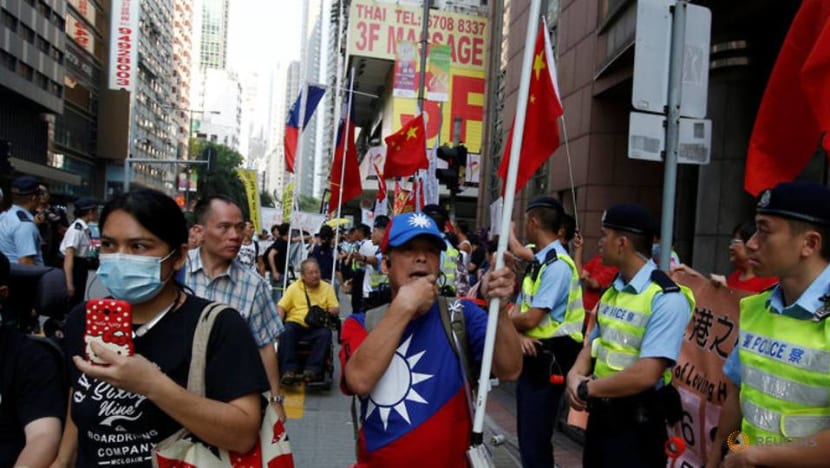
A protester wearing a a T-shirt featuring a Taiwan flag walks past pro-China protesters, during a demonstration on China's National Day in Hong Kong, China October 1, 2018. (Photo: REUTERS/Bobby Yip)
SINGAPORE: In China’s ever-expanding efforts to diminish the international standing of Taiwan, Taiwan scored a tiny victory last year, thanks to United Airlines.
In response to China’s demand to foreign airlines to remove on their websites any reference to Taiwan as a country or region under destination listings, United Airlines came up with a creative solution.
It enabled a new function allowing ticket bookers in Taiwan and China to select their locations by the currencies they use – New Taiwan Dollar and Chinese Yuan respectively – a move that speaks volumes on the distinction between the two destinations.
The gesture won the gratitude of Taiwan, which thanked the airline for the flexible workaround.
Since Tsai Ing-wen of the pro-independence Democratic Progressive Party (DPP) became Taiwan’s president in 2016, China seems to have redoubled its efforts to poach Taiwan’s diplomatic partners, as well as arm-twist individuals, companies and countries to bow to its “one-China” policy.
Even a teenage Taiwanese singer of a K-pop girl group Twice, who came under pressure to apologise for holding a Taiwanese flag, and a Taiwan-owned coffee chain, which served coffee to Tsai on her visit to the US last year, were not spared from China’s nationalist ire.
‘ONE COUNTRY, TWO SYSTEMS’ FOR TAIWAN?
Chinese president Xi Jinping recently delivered a speech that advocated “one country, two systems” as the best way to achieve “peaceful reunification”.
Xi promised to “respect Taiwan’s social system and way of life” and “protect private property, religious beliefs and legal rights of the Taiwanese” after reunification.
Tsai swiftly responded to Xi’s proposal, declaring that Taiwan and the majority of the Taiwanese will not accept the “one country, two systems” arrangement, and that this position is the “Taiwan consensus”.
The embattled president’s unequivocal statement won her much support on social media.
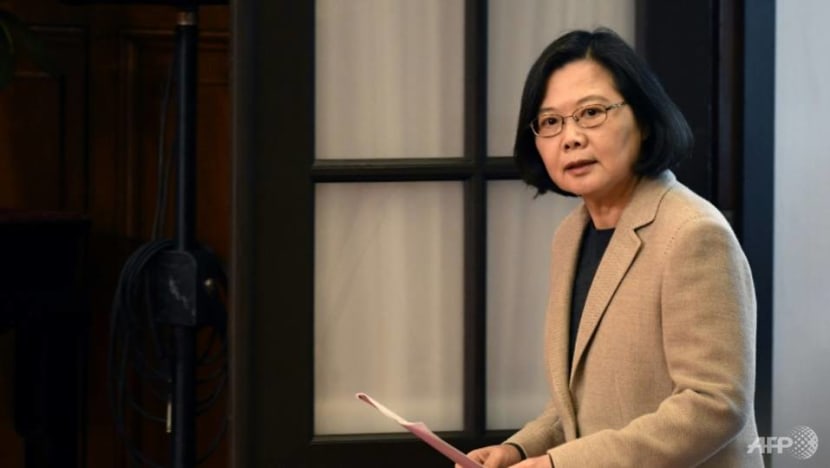
Even the Beijing-friendly Kuomintang (KMT) said that most Taiwanese would not support the “one country, two systems” arrangement.
It thus seems that Xi’s proposal, however pleasing to China’s nationalists and hardliners, has fallen flat in Taiwan.
LEARNING FROM THE TAIWAN OPINION POLLS
Demographically representative opinion polls in Taiwan done over the years by the Mainland Affairs Council, universities, political coalitions and think tanks based on random samples and robust polling methods suggest a few things China should know if it is sincere about seeking a peaceful solution to the Taiwan issue:
1) Consistent mainstream support for the status quo
Mainstream support for the preservation of the status quo remains very strong, and consistent with other demographically representative polls done by both the pan-Green and pan-Blue coalitions.
Notwithstanding the difference in how the survey questions were phrased, “preservation of the status quo”, broadly defined, had support ratings ranging from 66 per cent to as high as 83.4 per cent in recent years.
These results are not the exception – poll results over the last decade have consistently indicated that most Taiwanese wished to maintain the status quo in contrast to the minority that eagerly and insistently advocate unification with China or the declaration of Taiwan independence.
2) Consolidation of the Taiwan identity
Taiwan’s National Chengchi University has tracked changes in the Taiwanese identity for more than two decades.
In 1992, 46 per cent of the respondents said they saw themselves as both Taiwanese and Chinese and another 26 per cent thought of themselves as Chinese and not Taiwanese.
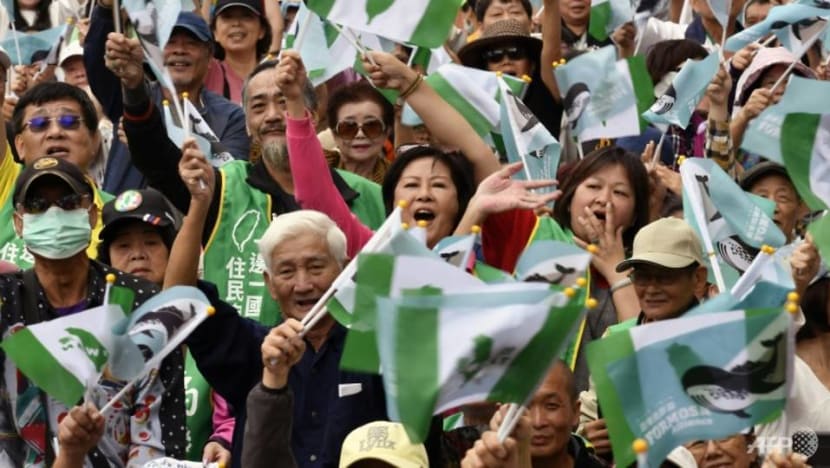
Only 18 per cent identified themselves as Taiwanese and not Chinese.
The percentage of respondents that chose a Taiwanese-only identity surpassed that which chose a dual-identity of Taiwanese and Chinese for the first time in 2008, and this percentage has climbed steadily ever since.
By 2018, those who embraced a Taiwanese-only identity had grown significantly to 55.8 per cent, whereas those who endorsed a dual identity shrank to 37.2 per cent. The percentage of Taiwanese who thought of themselves as Chinese also fell drastically to 3.5 per cent.
This growing Taiwanese identity suggests more Taiwanese see themselves as being distinctively different from mainland Chinese, though they acknowledge they are ethnically Chinese.
Another indicator of a rising Taiwan national identity is that nearly 70 per cent of Taiwanese, despite Beijing’s insistence, did not think that recognition of “one China” is a precondition for cross-strait interaction and Taiwan’s international participation.
3) Commitment to democratic values and way of life
According to the latest wave of World Values Survey, close to 50 per cent of Taiwanese believed that the freedom to choose their leaders is an essential feature of a democracy, in contrast to 20 per cent in China and 28.7 per cent in Hong Kong.
In a 2018 survey by the Taiwan Foundation for Democracy, 76.4 per cent of Taiwanese agreed that democracy is still the best political system despite some problems with it.
Those who are more committed to democratic values are also more willing to fight for Taiwan in the event that China uses force against Taiwan for unification. In fact, 68.1 per cent said they will.
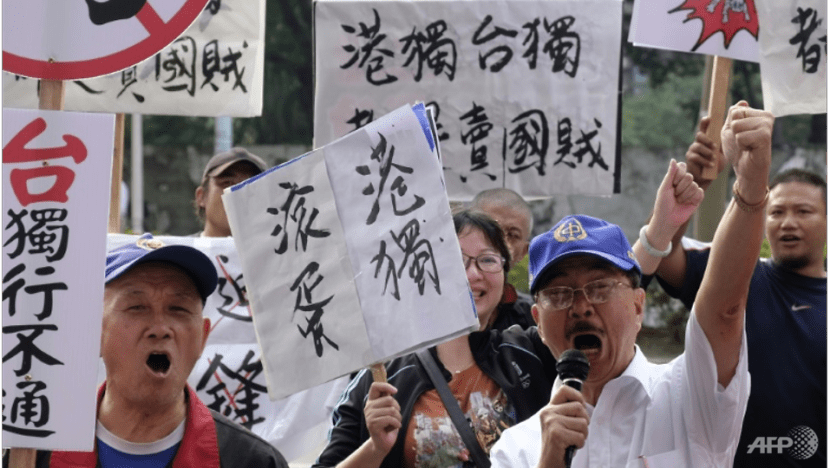
Close to 80 per cent of those polled by Taiwan’s Mainland Affairs Council last year supported the government in upholding freedom and democratic values; 86 per cent backed the government’s stand that Taiwan’s future and the development of cross-strait ties should be decided by the 23 million people in Taiwan.
4) Mistrust of China
China’s carrot-and-stick approach towards Taiwan has not won the hearts of Taiwanese.
The same survey by the Mainland Affairs Council shows that around 78 per cent of Taiwanese disapproved of China’s tactics to isolate Taiwan internationally through the poaching of Taiwan’s shrinking circle of diplomatic allies, as well as its persistent use of coercion and threats against Taiwan in politics, military and diplomatic affairs.
Countries that have severed diplomatic ties with Taiwan to establish relations with China over the past year include the Dominican Republic and El Salvador.
Although close to 45 per cent believed that the Chinese government was friendly towards the Taiwanese, 55.7 per cent were not appreciative of Beijing’s recent policy to issue residence permits to Taiwanese that entitle them to the same benefits and public services as the mainland Chinese.
They believed that the policy, using the pretext of providing convenience to the Taiwanese residing in China, was a politically motivated “united front” strategy.
LESSONS FOR CHINA
The opinion polls suggest that China’s carrot-and-stick strategies could have the opposite effect of fuelling the rise of the Taiwan national identity.
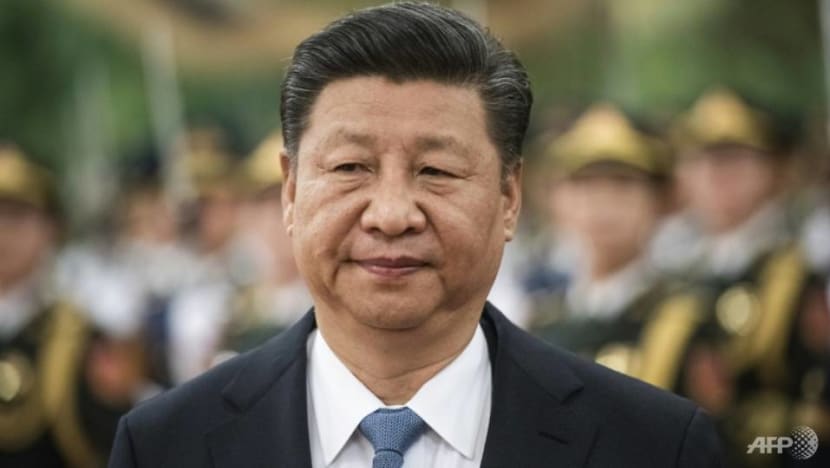
Taiwanese commitment to democracy and its values also means that the contrasting political systems on both sides of the strait stand in the way of reunification, contrary to what president Xi said in his speech.
While Xi may be eager to realise reunification while he is in power, the majority of the Taiwanese still prefer to stick to the status quo for the time-being.
China’s nationalists have to understand that no Taiwan government, whether it’s the DPP or KMT, will acquiesce to the “one country, two systems” arrangement simply because this is political suicide, given Taiwan’s democratic electoral system and mainstream public opinion.
And calling on China’s army to be “battle-ready” certainly won’t help foster trust in cross-strait relations.
Even though the path to peaceful reunification may be fraught with systemic hurdles, mutual respect and understanding, instead of coercion and hectoring, will go a long way to get both parties back to the negotiating table again.
Dr Yew Chiew Ping is head of the Contemporary China Studies Minor at the Singapore University of Social Sciences.














